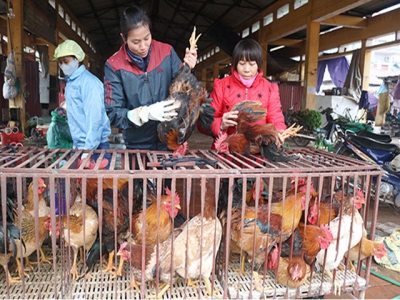Bac Giangs chicken raising for Tet: quality is better than quantity

Yen The hill chicken is one of the key products of Bac Giang province. In order to ensure the supply for the market during the Lunar New Year (Tet) holiday, these days, chicken farm owners and households in the district have focused on caring, protecting and developing the brand of hill chicken raised under safe processes.
Traders buy Yen The hill chickens to sell in many provinces across the country.
Closed-loop production
Chicken raising households in Yen The district have step by step formed cooperative groups and cooperatives to support each other in terms of techniques and breeds, and signed contracts with businesses to purchase products. Luong Van Hien, deputy head of the district Division of Agriculture and Rural Development, said that the district has 20 chicken breeding cooperative groups, mainly in communes such as Tam Tien, Canh Nau, Dong Tam, Tien Thang, Tam Hiep and Hong Ky
In recent years, the district has maintained two closed breeding chains from production to processing and consumption of the Yen The Green Agriculture Cooperative and the Giang Son Joint Stock Company.
This time, the Giang Son Joint Stock Company focuses on guiding households to actively take care of chickens in accordance with technical procedures, ensuring the quality and sufficient supply for customers in line with placed orders. The company buys breeding chickens from reputable establishments, ensuring uniformity and clear origin. Households are instructed to periodically clean the barns, and vaccinate chickens regularly. Regarding feed, in addition to vegetables and corn, it has signed contracts with bran suppliers in each period of growth and development of the chicken flock. As a result, the company has been certified as raising chickens under the VietGAP process. It is expected that during this Tet holiday, it will supply more than 500 tonnes of live and slaughtered chickens to the markets of Hanoi, Hai Phong, Quang Ninh, tens of tonnes higher than the previous year. In addition, it will also process chicken pies for sale in Hanoi and supermarkets in some provinces.
Similarly, members of the Yen The Green Agriculture Cooperative are busy taking care of their poultry. With many years of experience in chicken raising, the family of Nguyen Van Su in De Tham village, Dong Tam commune shared: “My family strictly follows the VietGAP breeding process. On days when the temperature is low, we provide chickens with minerals and warm them. About a month before selling, the chickens are fed with corn to produce solid and delicious meat.
There are always 2,000-2,500 chickens in his farm. Recently, his family sold 1,000 hybrid bantams at the price of 55,000 VND per kg, earning him more than 10 million VND after deducting production costs. On this Tet occasion, he plans to supply 1,000 hybrid bantams for customers.
According to Giap Quy Cuong, Director of the Yen The Green Agriculture Cooperative, in order to ensure sufficient supply, the cooperative has linked with 87 livestock breeding households. This year, for the first time, the cooperative is certified as following the VietGAP breeding process. It has signed contracts to purchase 10,000 chickens from households during the upcoming Lunar New Year.
Increasing the rate of chickens raised under VietGAP process
According to the plan, during this Lunar New Year, the whole district will provide the market with 2-2.2 million chickens of 4-5 months old, of which hybrid bantams account for about 50 percent. At this time, the hybrid bantam costs 60,000 VND per kg and the hybrid mia chicken is sold for about 55,000 VND per kg. This prices are expected to increase in the run-up to Tet.
To ensure the quality of hill chickens, the district recommends households maintain a stable total herd of 4.3 million chickens per year and not massively increase the number when prices are high. Instead, they should focus on following bio-safety breeding procedures, especially VietGAP. At the same time, specialized agencies and the People's Committees of communes need to well implement disease prevention and control measures.
To ensure the quality of hill chickens, the district recommends households maintain a stable total herd of 4.3 million chickens per year and not massively increase the number when prices are high. Instead, they should focus on following bio-safety breeding processes, especially VietGAP.
Especially, with state budget funds, the district has spent billions of dong supporting farmers in sustainable chicken raising, building models and completing VietGAP certification documents for qualified units.
According to Than Minh Sam, Vice Chairman of the district People's Committee, this year the rate of chickens raised under the VietGAP process in the whole district reached 30-35 percent of the total, an increase of 7 percent over the previous year. To promote the Yen The hill chicken brand, from now to 2025, the district strives to increase this rate to 65-75 percent. The district has urged households to raise livestock on a concentrated scale instead of small scale. It also focuses on attracting businesses to invest in processing facilities, and encourages breeders to increase the rate of hybrid bantams to about 60 percent.
Có thể bạn quan tâm
 Prevention, control of foot-and-mouth disease in cattle herds
Prevention, control of foot-and-mouth disease in cattle herds After a period of lull, foot-and-mouth disease (FMD) in cattle has reappeared recently. This makes the specialized agency as well as the breeder very concerned
 Bac Giang harvests nearly 40,000 tonnes of orange, pomelo
Bac Giang harvests nearly 40,000 tonnes of orange, pomelo This time, the localities in Bac Giang are harvesting citrus fruits such as orange and pomelo. This crop enjoys big output and convenient consumption.
 An Giang Province keen to set up agricultural co-operatives
An Giang Province keen to set up agricultural co-operatives The Cửu Long (Mekong) Delta province of An Giang plans to establish at least 200 new agricultural co-operatives within the next five years.